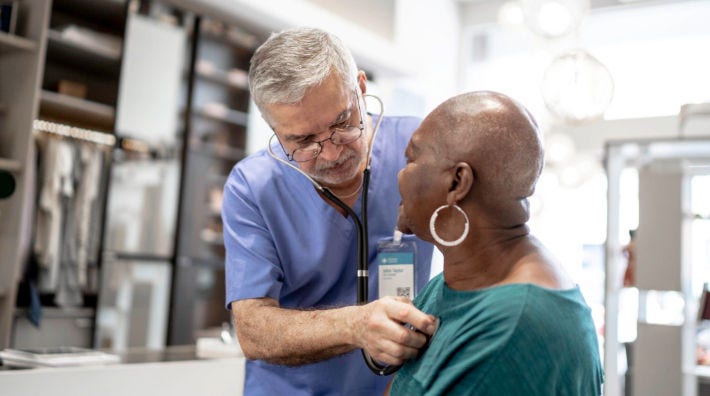Can Chemo and Other Cancer Treatments Cause Heart Problems?

Chemotherapy — often called “chemo” — can be difficult on the body, including the heart. “Cancer therapies can cause a broad spectrum of cardiovascular diseases,” said Joerg Herrmann, MD, a cardio-oncologist at the Mayo Clinic. Cardio-oncologists specialize in treating heart problems in people with cancer.
Some of the heart problems that cancer treatment can cause include:
- Heart failure
- Heart attack
- Stroke
- Heart rhythm problems
- High blood pressure
- High lipids, which can raise your risk of heart attack
“When choosing cancer treatment, the goal should be for patients to receive the best possible cancer therapy at the lowest possible cardiovascular risk,” said Dr. Herrmann.
How will you know if the chemo you receive can cause heart damage?
Different types of chemo can cause different heart issues. These problems can range in how severe they are, how often they occur, and how long they last.
Your care team will let you know the side effects of your treatment options, including possible heart damage.
“It’s important for patients to ask if the chemotherapy they’ll receive might damage their heart, and, if so, if there are ways they can lower that risk,” said Kathryn J. Ruddy, MD, MPH, FASCO, an American Society of Clinical Oncology (ASCO) expert and medical oncologist at the Mayo Clinic.
Keep in mind, though, that certain heart problems might not cause any symptoms. “Some of the early stages of these diseases may be completely asymptomatic and develop without being recognized,” said Dr. Herrmann. Having ongoing conversations with your doctor about any known heart-related side effects of the treatment you’re receiving is important. This can help determine if monitoring or preventive measures may be needed.
You should also tell your doctor right away if you experience any signs of heart problems from chemo. These may include chest pain, ankle swelling, fatigue, a racing heart, or difficulty breathing.
What types of chemo can cause heart problems?
The heart effects linked to getting chemo depend on the type of chemo being planned. For example, some treatments include a type of chemo called an anthracycline. These are classified as anti-tumor antibiotics that change the DNA inside cancer cells to help damage or destroy the cells. Some of the heart problems linked to this kind of treatment include:
- Reduced left ventricular ejection fraction (LVEF): LVEF indicates how well your heart pumps blood to the rest of your body. If the LVEF is reduced, it means your heart might not be pumping blood as well as it should.
- Heart failure: This condition occurs when the heart can’t pump enough blood. If heart failure isn’t treated, it can lead to serious problems and even death.
Sometimes other types of treatment, including targeted therapy and immunotherapy, can cause heart problems. Radiation therapy to the left chest or breast areas can also cause damage to the heart. But these heart issues are usually different from those caused by chemo. When another treatment that causes heart problems is used along with chemo, the risk of heart damage can be higher. This is called a cumulative effect, meaning each treatment may add a little more stress to the heart. As treatment continues, the effects on the heart can build up.
How are heart problems managed during chemo?
“Heart problems in cancer patients, including those that develop during treatment, are usually managed as they would be under any other circumstances,” said Dr. Herrmann. “However, there are some nuances.” Usually, heart problems during chemo can be managed with medication.
Your doctor will typically work with a cardiologist to determine the best treatment plan for heart issues during chemo. Cardiologists are doctors who specialize in treating heart problems.
Can heart damage from chemo be reversed?
“Yes, in some cases,” said Dr. Ruddy. However, treatment to help reverse damage depends on the cause and severity of the damage. Finding and treating heart problems early can help increase the chances for reversal.
Can you get chemo when you have heart disease?
Heart disease is one of the world’s leading health issues. Many people with cancer may have a history of heart disease before being diagnosed with cancer. Most of these people can still receive chemo if it’s recommended.
“Sometimes we adjust our chemotherapy plans to minimize cardiac toxicity in light of a patient’s heart disease,” said Dr. Ruddy. “And I often ask a cardio-oncology specialist if additional heart protective medications should be initiated before or during chemotherapy in this circumstance.”
If you have severe heart disease, your doctor might recommend a cancer treatment plan that doesn’t include certain types of chemo or other treatments that affect the heart.
Questions to ask your doctor about cancer treatment and heart problems
Always talk with your care team about your family history and any heart problems you’ve had. Be sure they also know the medications and any supplements you take regularly and as needed. No matter what type of cancer treatment is planned for you, be sure to ask about how it could impact your heart.
Questions to ask include:
- What are the possible heart-related side effects of this treatment?
- What signs of heart problems should I watch for?
- How will we monitor my heart during cancer treatment?
- Should I see a cardiologist?
- What steps can I take to reduce my risk of heart damage and protect my heart during cancer treatment?
Dr. Ruddy is a member of ASCO’s Patient Information Editorial Board.
- Written by

Written by the American Society of Clinical Oncology (ASCO) with medical and editorial review by the American Cancer Society content team.



